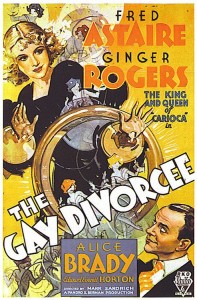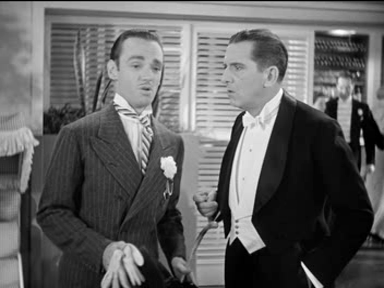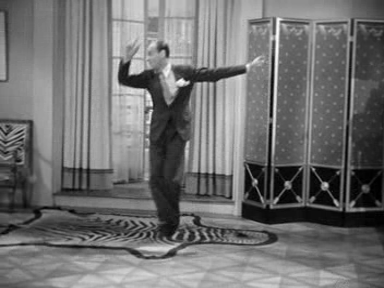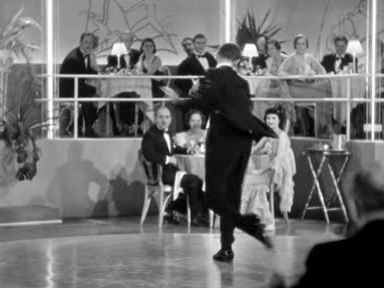Gay Divorcee, The (1934)
“Chances are that fate is foolish.”
|
Synopsis: |
|
Genres, Themes, Actors, and Directors:
Response to Peary’s Review: Ultimately, of course, the storyline in any Astaire-and-Rogers film matters much less than its dancing, songs, and humor. To that end, it’s too bad that most of Cole Porter’s original songs were axed (leaving only his iconic “Night and Day”), but Astaire’s song-and-dance performance of “A Needle in a Haystack” is quite memorable, and 17-year-old Betty Grable’s rendition of “Let’s K-nock K-nees” (sung to Horton) is pleasant as well. I’m much less a fan of the “famous, extravagantly produced 17-minute song-dance ‘The Continental’,” which goes on for far too long — but it is fun to see how Astaire and Rogers manage to “slip past Rhodes and onto the ballroom floor”, courtesy of a clever (if patently obvious) ploy using a silhouette on a record player. Meanwhile, playing “the ridiculous Italian co-respondent (a union man), Rhodes is absolutely hilarious” — he steals the movie whenever he’s on screen, whether he’s bungling his line-of-code (“Chance is a fool’s name for fate”) in an infinitely creative number of ways, or “calling his wife long distance” and boasting “that his nine-year-old son, whom he thinks he heard in the background, already has a voice that’s becoming deeper” (!). Alice Brady is effective as the ultimate ditzy socialite, and Horton is well-cast as a bungling lawyer struggling to live up to his father’s reputation — though Eric Blore (fresh from the stage play) is unfortunately given too few funny lines to make much of an impression. Redeeming Qualities and Moments:
Must See? Categories Links: |







One thought on “Gay Divorcee, The (1934)”
I don’t actually think this is a must. However…
~there are three wonderful musical numbers that do make it worth a viewing, if that’s all you need:
The opening number – ‘Don’t Let It Bother You’ – has the lovely conceit of singers using hand-puppets to augment their number. It’s quite charming.
‘Night and Day’ – the film’s centerpiece (therefore, midway) – is exquisitely performed and quite sexy. It might be the single reason to see the film.
And I happen to be a fan of the Busby Berkeley-esque ‘The Continental’. I find it quite entertaining, with a wonderful build, and it’s enticingly edited in a surprisingly still-modern way.
Personally, I can do without the rest of the farcical script and all that’s connected with it. But it’s your call.